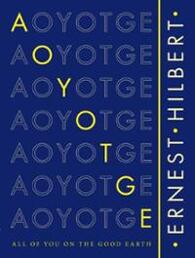The sonnet has been given new life. It mulls over existence in loneliness and in the dingy places, people, and pastimes we often overlook. In All of You on the Good Earth, Ernest Hilbert uses this traditional form as a vehicle to tackle the ancient question, what am I doing here? Sometimes the place is real, West Philadelphia or New York, but no matter the setting, the speaker has the same agenda: to observe, to pick apart, to make sense, to come to a conclusion about his surroundings. As humans and as thinkers, this is what we do, Hilbert suggests. In “Seneca at the Baths,” the speaker questions the purpose of mundane, unthought-of objects:
Is the ideal ruler to crack knuckles Or shaft sited to repair fractured bone? A trellis to train vines through a season Or a fence to divide, secured by patrols? It is the duality of these things that he is most concerned with. This is not to say that rulers, trellises, and ladders have multiple purposes, though they may, but that their purposes can be debated, based on perspective. Needless to say, perspective is important. However, Hilbert insists that perspective, where and how we are when we observe, is everything. We don’t know who the speaker or the addressed is, who “I” or “we” or “you” signifies, but we can gather that these are never the same. Each sonnet is its own narrative peering into the window of a single moment – like a soliloquy, each 14-line poem is recited in isolation. Something has sparked a thought or an association, and the sonnet serves as a finite method to record and explore these moments. Hilbert often reveals where he is in the titles or in the first few lines. At one point, he is on “a crowded train compartment, regretting his life;” at another, he is “at a friend’s empty loft.” In these instances, he is explicit in stating his physical, spatial place, but there are also points where he is at a mental location. “Outsider Art” queries the origin and preoccupation of artists, particularly writers. Ironically, the last line speaks of “the moment something truly begins;” this is the premise of an idea, the captured moment of realization. Just as Hilbert observes his modern world, he also reflects on the past, not his past, but that of humanity. He does so as if he was there, as if he able to time-travel and seize these moments for future examination. He writes of wise Plato and foolish dictators, Sophocles and Euripides. Why mention these greats at all? The prelude poem “Dusk in the Ruins,” though told in present time, describes a visit to Necopolis, Vulci. The speaker “arrives, one more uninvited guest” to a place where “whole histories, spread and cooled in their course, / Load this darkened air.” The atmosphere hangs heavy with history, and all that is left today, no more than ruins, exists amidst all the modernity. Hilbert recognizes this disconnect by acknowledging how his live presence disrupts the long-dead remains. Yet instead of separating past and present, he has compiled them into one collection that does not discriminate. He recites sonnets to both, constantly revisiting the ancient question. A denizen of the present and an admirer of the past, Hilbert is human: he is an observer. He doesn’t overlook the not so pristine images of industrialism or modernity, but he also does not herald the great histories. Instead, he delves into both, mixing old and new, reaching for truth as he sees it, using one of the most classical literary forms, each sonnet a small window looking out to the larger view.
0 Comments
Leave a Reply. |
Archives
July 2024
Categories
All
|
|
Glassworks is a publication of Rowan University's Master of Arts in Writing 260 Victoria Street • Glassboro, New Jersey 08028 [email protected] |
All Content on this Site (c) 2024 Glassworks
|


 RSS Feed
RSS Feed
